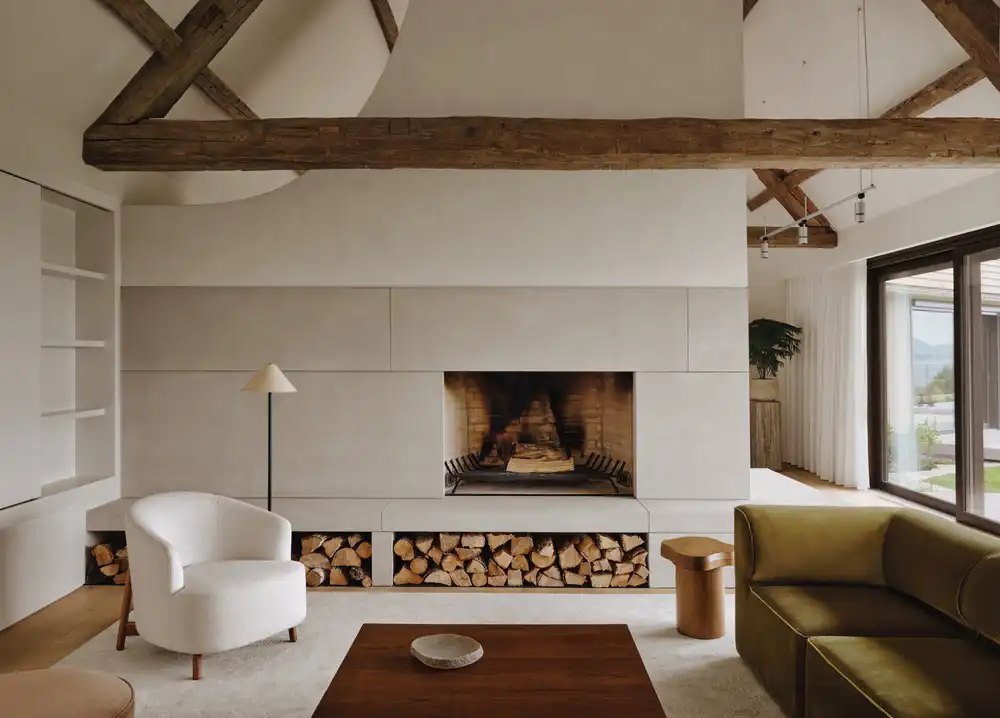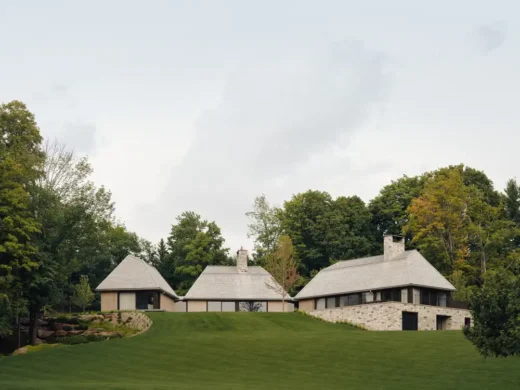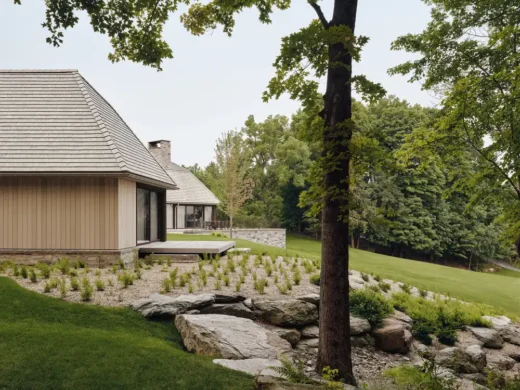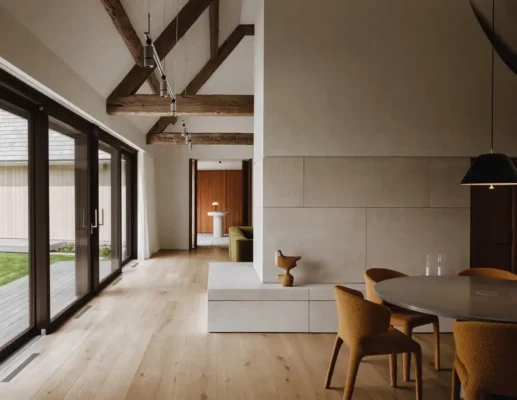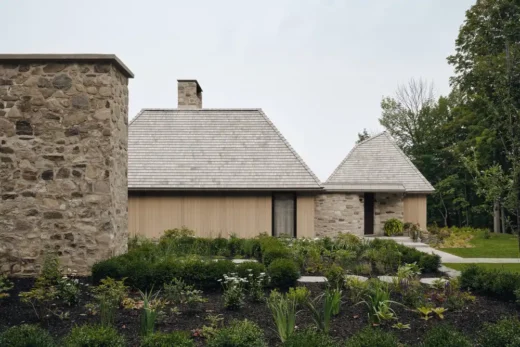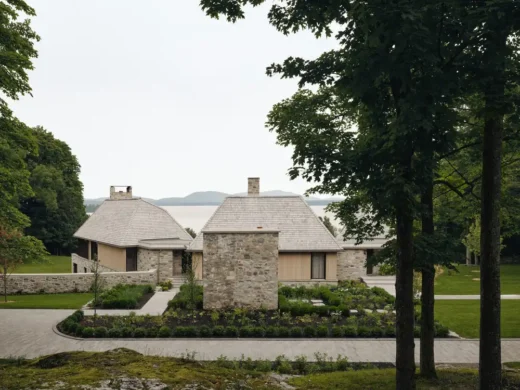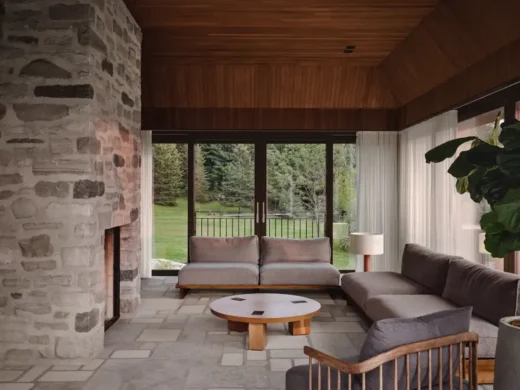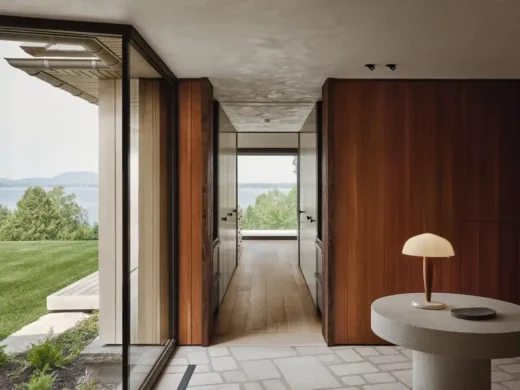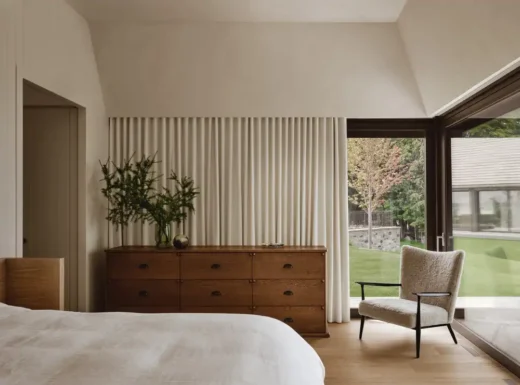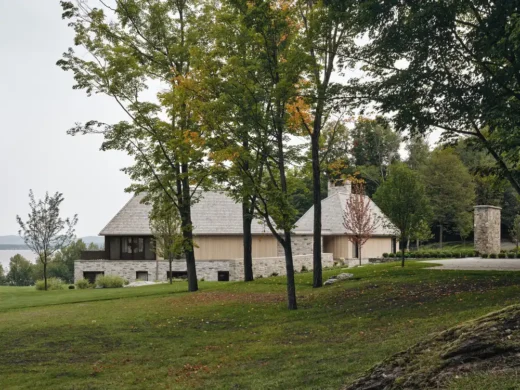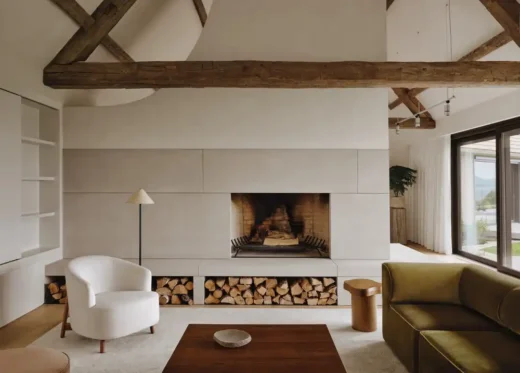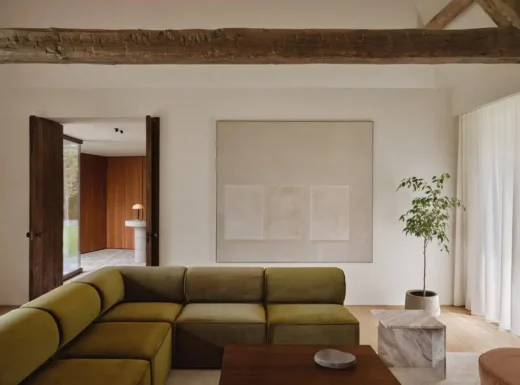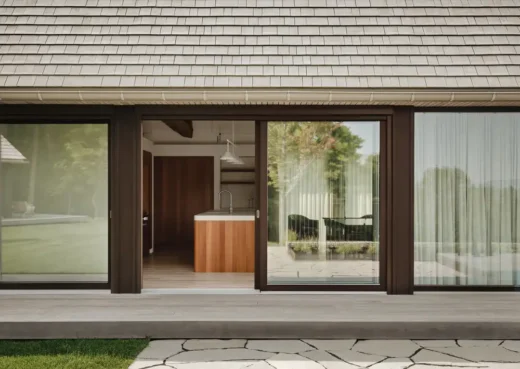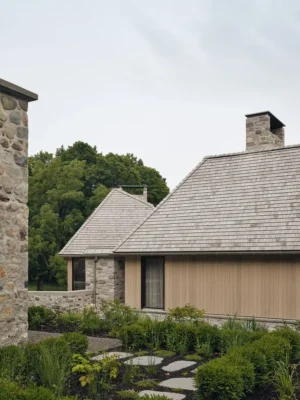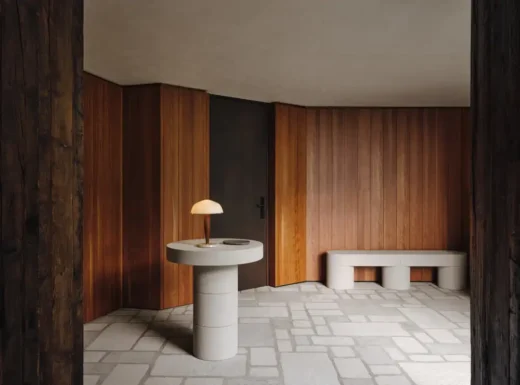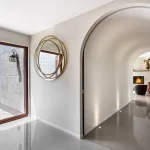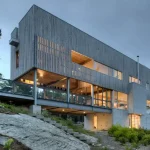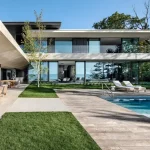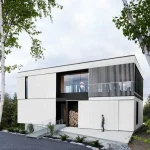BROM Country House, Quebec residential property images, Modern Canadian home design
BROM Country House in Lac-Brome
June 13, 2025
Architecture: AtelierCarle
Location: Lac-Brome, Brome-Missisquoi Regional County Municipality, Montérégie administrative region, southern Québec, Canada.
Photos: Alex Lesage
BROM Country House, Canada
This project is grounded in a critical approach to sustainability issues related to residential architecture in rural areas. This approach is embedded in the site’s context: a prestigious estate that had been occupied by the same family for nearly a century, located on the shores of a lake in the Eastern Townships region. In relation to this type of mandate, the aim was to develop a cultural reflection on the intervention, considering the constant transformation of Quebec’s rural landscape. It is important to uphold a critical perspective on aesthetic approach, in the philosophical sense of the term, in order to reposition contemporary architecture — not solely in relation to universal environmental concerns, but in relation to what is considered a product specific to our culture, our shared body of work.
“Aesthetic does not mean what concerns beauty, but rather what relates to the sensory, to the sensory experience that is common to both what we call political and artistic practices…” Jacques Rancière, L’expérience esthétique-Dialogue avec Bernard Aspe, Ed. Nous, 2025
Implantation – The duty of memory
The scale of the occupancy program desired by the client, combined with the deterioration of the existing building (a wooden structure from the early 20th century with rubble stone walls), necessitated moving away from the preconception of total conservation to instead adopt a renewed conceptual approach, one more specifically rooted in the site — resulting from the construction of a new building on the property. In doing so, the focus was shifted away from a self-referential architectural language, detached from the site’s historical context. The goal was to situate the proposal in time and embed it within a kind of cultural continuum, however specific it might be.
This approach places architectural design within reality, rather than a referential framework, however subtle it may be. The existing elements—fragile and immaterial as they are—become the foundation for architectural development, prompting a reflection on what truly constitutes durability. Here, material and form do not emerge from aesthetic preconceptions; rather, they take shape within reality, revealing themselves as meaningful and sensitive markers of cultural anchoring.
The project’s implantation establishes the groundwork for this dialogue. In an effort to preserve what remained stable from the existing structure, the foundations and masonry chimney of the former residence were retained, shaping a specific siting strategy. As a result, entry to the new building involves passing through the remnants of the old one—a kind of subtle act of remembrance, a duty of memory—which defines the arrival at the property. The secondary buildings on the site have been preserved and incorporated into the overall landscape design.
This new configuration, conceptually establishing a dialogue between the new and the disappeared, reveals the enduring nature of stone in relation to foundation work versus the ephemeral character of wooden frameworks in the construction of rural architecture: a fragile material history that is often trivialized in the construction process.
The implantation, also related to a slope present on the site, allows for the creation of a basement and provides a full-height level for the rooms on this floor. The ground floor also benefits from the same relationship to the site throughout the spaces, thus offering a fluid transition between the interior and the exterior.
Fragmented structures – Landscape and material permanence
The use of masonry for the floors and foundations of the new intervention establishes a perceptual link with the past, blurring the two temporalities of the territory’s occupation. The freestanding development, configured in three contiguous buildings, breaks the scale of the new layout and refers to proportions more akin to those of 19th-century rural architecture. The intervention thus seeks to maintain a mode of territorial occupation specific to this region, despite the scale of the requested program.
Two volumes containing the entrance halls of the residence are designed with stone cladding, thus providing aesthetic and material continuity with the enduring components of the old structure. New retaining walls are articulated around these core volumes, defining the axes for the development of the three pavilions. The masonry of these volumes extends into the interior, offering a smooth transition to more delicate materials.
The above-ground structural components are a combination of metal frames, wood, and exposed beams made from reclaimed wood. The four-sloped cedar roofs have high proportions and dominate the composition. They reference the surrounding monumental landscape of the Monteregian Hills, which is visible from the site. The fenestration constitutes the true point of rupture in the relationship to the place: that of an American colonial architecture, self-referential in nature, where the windows are arranged as part of a façade composition, rather than in relation to the landscape. In contrast, the proposed architecture aims to integrate with the landscape. In a way, the generous openings of the new project are not merely components serving the architectural language, but a direct link to the structure of the landscape.
Interiors: Suspended temporality
In plan, the spaces on the ground floor are organized in a continuous sequence, returning to a distribution of simple spaces where horizontality is prioritized, thus reflecting the landscape. Divided by large doors made of reclaimed wood, the plan offers fluidity to the spaces, despite the fragmentation of the volumes, which is perceptible from the outside. Most of the spaces on the ground floor are designed as cathedral volumes, with reclaimed beams adapted to the new structural constraints of the project.
Stone, the leitmotiv in the deployment of spaces, grounds them in the site, prolongs the material traces of the fragile history of this property in the Townships, and provides a homogeneous thermal mass for all the interior spaces, powered by a geothermal system.
The choice of materials and furniture places the character of the spaces in an aesthetic situated between the old and the new, between the past and the present. Few materials other than natural components are used for the interior finishes, chosen for their durability and low emissions of volatile organic compounds.
In the same way that the architectural development ‘blurs’ the before and after, the atmosphere of the interiors suspends the identity of the experience of one’s own home, establishing a sense of permanence in the built environment over time, from the inside to the outside.
Interventions related to this type of project are too often characterized by an overconsumption of goods, and even by the dismantling of viable components. This project’s approach, as a whole, extends the life cycle of what can be preserved, of what is already there.
In summary, this project weaves sensitive relations with the timeline, thus creating an architectural landscape that participates in our culture; it somehow contributes to the transformation of our rural world, our common well-being.
BROM Country House in Quebec, Canada – Building Information
Design: AtelierCarle – https://ateliercarle.ca/en/
Name: BROM
Location: Lac Brome, Quebec, Canada
Year: 2024
Area: 692 sqm / 7,450 ft²
Team
Alain Carle / Founding Architect
Isaniel Lévesque / Architect Project manager
Baptiste Balbrick / M. Arch
James Jabbour / M. Arch
Sarah Mei Mousseau / Technologist
Camille Denis / Decorator
Collaborators
General Contractor : BBD Construction
Structural Engineer : VCMa
Mechanical Engineer : Antoine Assaf ing.
Landscape Architect : Oscar Hacche
Reclaimed Exposed Wood Structure : Taylor Lukian
Masonry : Maçonnerie Sutton (supplier: Carrière Ducharme)
Shingles & Exterior Cladding : Groupe Sidex
Windows : Gaulhofer
Millwork : La Clef de Voûte
Lighting : Sistemalux & Lumenpulse
Wood Flooring : Unik Parquet
Concrete Flooring : Atelier B
Countertops : Béton Johnstone
Custom Furniture : Élément bois
Photo Credit: Alex Lesage (alexlesage.com)
About Alain Carle
For more than twenty-five years, Alain Carle has relied on a pedagogical approach that he developed as a teacher and researcher in the Master’s program at the School of Architecture of the University of Montreal. In 2023, in a perspective of continuity and consolidation of the achievements of the last decades, Carle joined forces with five key collaborators to become AtelierCarle, thus underlining a new inclusive and forward-looking project.
Formed by creative and daring minds, the firm’s team presents projects where the specificity of place, the precise work of materiality, and diversified construction techniques are an integral part of the creative process.
Founder Alain Carle presents lectures that highlight the firm’s creative approach, but also his own sensitivity to the theoretical approach to projects. One of them, “La part du paysage”, states the essential component of the landscape not as a vector of identity, but rather as an opening on its specificity, its exemplarity, and its capacity for modification.
Photo: Alex Lesage (alexlesage.com)
BROM Country House in Lac-Brome, Quebec information / images received 210420 from v2com newswire
Location: Lac-Brome, Montérégie administrative region, southern Québec, Canada, North America.
Québec Homes
Québec Home Designs
Mountainside Residence, Bromont, Québec
Architects: MUUK Architecture
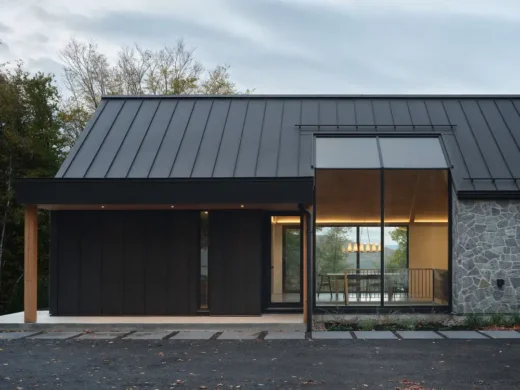
photograph : James Brittain
Montpellier House, Saint-Bruno, western Québec
Design: Vives St-Laurent
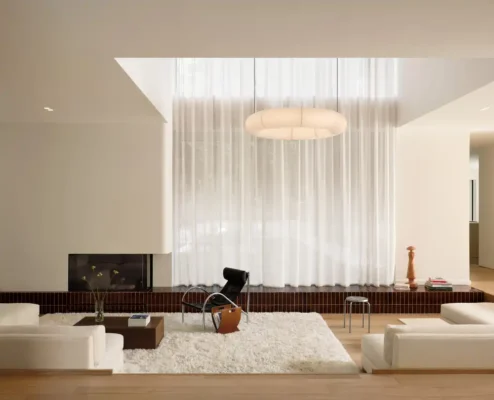
photo : Alex Lesage
Lake Jasper House in Chertsey, Chertsey, Matawinie, Quebec, Canada
Design: Architecturama
Maison du Parc in Montréal
Design: la SHED architecture
Québec Architecture
Montreal Architecture
Montreal Architecture Designs – chronological list
Montreal Architectural Tours
Montreal Architecture Tours by e-architect
Canadian Architectural Designs
Canadian Building Designs – architectural selection below:
Comments / photos for the BROM Country House, Lac-Brome, Quebec Canada Architecture design by AtelierCarle page welcome.

